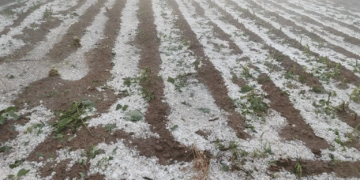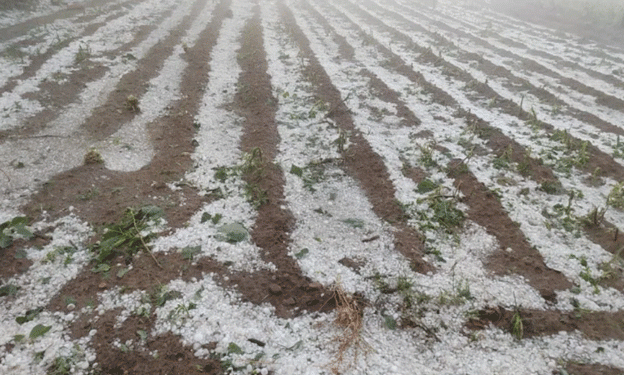A powerful hailstorm that swept through six municipalities in Tarija, Bolivia, last Thursday has left extensive damage across local farms, with initial reports indicating crop losses of over 90% in the worst-hit areas. The municipalities affected include El Puente, Yunchará, San Lorenzo, Cercado, Uriondo, and Padcaya, areas where farming is central to the community’s livelihood. Early assessments from the Federation of Trade Unions of Peasant Communities of Tarija (FSUCCT) highlight the severe economic impact on these rural communities, particularly those in the central valley and highland areas of Tarija.
David Yuca, a representative of FSUCCT, stated that the hailstorm destroyed essential crops such as potatoes, peas, and maize, all of which play a significant role in local food supply and income generation. The damage extends across various regions within the affected municipalities; for instance, in Cercado, the communities of Sella, Lazareto, Tolomosa, Santa Ana, Turumayo, Guerrahuayco, and Obrajes were heavily impacted. Meanwhile, El Puente saw widespread losses in areas like Tomayapo, Paicho, Carrizal, and Río San Juan del Oro, where fields of onions, carrots, and maize were battered by hail.
Hailstorms are an increasingly common challenge for farmers in Bolivia and elsewhere in South America. Studies indicate that erratic climate patterns have intensified extreme weather events, affecting seasonal crop production and threatening food security. According to Bolivia’s Ministry of Rural Development and Land, hailstorms in past years have resulted in millions of dollars in agricultural losses, disproportionately affecting smallholder farmers who lack access to crop insurance or disaster relief. The recent storm in Tarija is a stark reminder of the fragility of local farming systems in the face of extreme weather.
As of now, FSUCCT and local agricultural authorities have not yet fully quantified the financial losses from this storm, but recovery is expected to be slow and costly. Replanting efforts, especially for crops like potatoes and maize, may be delayed as farmers assess damage to soil quality and erosion caused by the storm. In many cases, affected farmers will need financial assistance to restore their operations, an effort that local government and agricultural organizations are being urged to support.
The recent hailstorm in Tarija has severely disrupted agriculture in six key municipalities, underscoring the vulnerability of local farming communities to extreme weather events. With crop losses exceeding 90% in some areas, farmers face a challenging recovery ahead. Addressing climate-related risks and securing disaster relief support will be crucial in helping Tarija’s farmers rebuild and prepare for future climate uncertainties.































